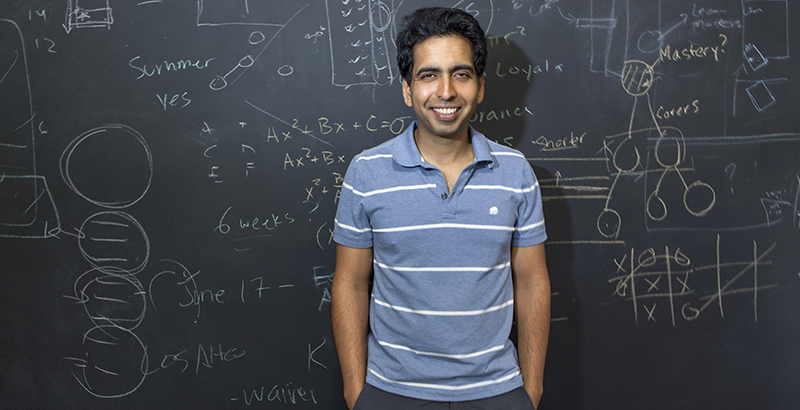74 Interview: Sal Khan on Personalized Learning, a Global Diploma, and How He’d Spend $100 million

See previous 74 interviews, including 2017 Teacher of the Year Sydney Chaffee, former education secretary John King, and former secretary of state Condoleezza Rice. The full archive is right here.
Every founder has a startup story. Sal Khan’s, famously, starts in a closet.
In fact, Khan may have one of the most celebrated closets in the world. For the few who don’t already know the origin story, it was tucked inside those doors that the virtual tutoring sessions he was conducting for his cousin catapulted into Khan Academy, which now boasts more than 10 million learners per month worldwide watching its free instructional videos online in over 18 languages. (I count myself among them.)
Khan Academy, a nonprofit organization, has democratized access to instructional resources and fundamentally influenced how students, classroom teachers, and parents use online tools to build content knowledge and develop an understanding of academic concepts and the workings of the world around them.
A March 2014 study by SRI Education found high levels of engagement and satisfaction among both student and teacher users. Seventy-one percent of students surveyed reported that they enjoyed using Khan Academy, and 65 percent of teachers — including 72 percent of educators in schools serving low-income communities — said that Khan Academy increased their ability to help struggling students catch up.
Innovation has been crucial to the platform’s longevity, creating new contexts and use cases for its offerings. Videos are now supported by complementary materials that reinforce and assess skills. Through deep partnerships with organizations like the College Board, Khan Academy has transformed how students prepare for AP and SAT exams and significantly leveled the playing field for students who can’t afford expensive test prep.
Data from last May showed that 20 hours of prep on Khan Academy’s free official SAT practice platform resulted in an average score gain of 115 points. A new brick-and-mortar private school in Silicon Valley is testing theories and philosophies about personalized learning in situ.
A lot has changed since Khan first closed the doors of his closet and opened up a world of possibility for learning at a time, place, and pace of one’s choosing.
Sal Khan grew up in Louisiana, attended public school, and found his way to the Massachusetts Institute of Technology, where he studied electrical engineering, computer science, and math and earned both B.S. and M.S. degrees. He also holds an M.B.A. from Harvard Business School.
The 74 checked in with Khan, looking back on how far he’s come and asking him to foreshadow what he’s excited about in the future.
The 74: At the heart of Khan Academy is a very humanistic idea — that everyone wants to learn. You are heading into your second decade as an organization. Can you reflect on how far you’ve come?
Sal Khan: When I started working on Khan Academy, this idea of a self-learning platform didn’t really exist. The stereotype was that most students didn’t want to learn. That’s what you hear a lot. That kids are disengaged, and 10 or 20 percent of kids are actually trying.
I think it’s closer to 80 or 90 percent who want to learn — and if you give them the tools to do so and they’re not feeling embarrassed or they’re not shamed or they’re not being promoted ahead where nothing makes sense … If you give them a safe environment, 90-plus percent of all human beings deeply want to learn, and not only do they want to — they might say they want to for career reasons — they actually enjoy it.
It’s a very human, it’s almost a basic thing that makes us different from the rest of the animal kingdom. I would say the majority of our testimonials come from people who not too long ago felt marginalized, ready to give up, thought they disliked a subject. But once they were given a tool where there was no shame, no embarrassment, no judgment, they really got excited.
There’s one student who went from being a high school dropout to showing up at Princeton. There’s a young girl in Afghanistan who was forbidden to go to school or middle school by the Taliban. She self-learned on Khan Academy. She’s now doing research with one of the most prominent physicists at MIT.
So that’s been the most positive surprise: how much potential is out there — you just have to give people the tools.
Khan Academy was on the forefront of personalized learning. How do you define it, and has that definition changed or evolved since 2007?
That’s a really good question, and here’s the straight thing: When we were starting off, it wasn’t that used of a word. Now, everyone says it. For us, personalization is — and we could talk about the different flavors of personalization that people use out in the world — but for us, it is, you learn at your own time and pace. It’s that simple, and we think it is closely linked to the idea of mastery learning.
In traditional learning, you are pushed at a set pace: You take a test; you get a C in exponents, even though you didn’t know 20 percent of the material; you’re then moved on to logarithms or negative exponents or something that builds on top of it. In mastery, we say, “Hey, you know, why don’t we keep working on basic exponents a little bit, because if you don’t, that next concept is going to be even harder.”
And so, in order to do that, you have to be able to flex according to students’ needs. You have to be able to personalize the time and pace for them to learn. It’s really that simple.
What would you do if you received a $100 million grant tomorrow?
Before I answer that, I just want to double underline something. People say of Khan, “Wow, it’s growing so fast, it’s reaching so many people and we’re covering all these content areas, we have these partnerships …” And to be fair, we do have great partnerships, we do have great supporters … But we are not an endowed organization. We are actively fundraising. In order to accelerate, to deliver on a free, world-class education, for anyone, anywhere, we do need to fundraise, and as you mention, the impact is just so great that the more fuel we can add to this fire, the better.
And so to answer your question, if we got $100 million tomorrow, I would accelerate our efforts for, what I call, a global diploma. A lot of people can learn things on Khan Academy. But the real, final piece of the puzzle is, can someone prove what they’ve learned in a way that is transferable and recognized anywhere in the world — and is thought highly of anywhere in the world and is part of a well-defined pathway to either career opportunities or further academic opportunities?
So is this a universal credential — can you tell us more about how you define a global diploma?
Let’s say that the first level of the global diploma is that you have a strong understanding of algebra, trigonometry. A strong understanding. This is something that Khan Academy can uniquely do — we can measure that you have grit and perseverance and when you set a goal and you can stick to it, so we can also make that part of their credentials.
And then, we partner with the major employers of the world and they make a commitment that anyone who achieves this first level of credential, they will interview for either an internship or for an entry-level job. That, by itself, becomes a very, very big deal. It seems simple and almost intuitive, but think about the world today: You can be an incredible student at your local community college, do incredibly well … You go to the neighboring town, they might not know what you did. You could be the top student in your country and you graduate from the top university in your country, but then you go to another country and no one knows where that is.
Obviously, you can think about students who are constantly in transit, whether it’s refugees, kids of the military, military families, or soldiers in the military. And all of a sudden, there’s something that’s globally recognized. It’s connected to employers and the population. It is free and universally accessible. That can be powerful.
And then, you can imagine a Level 2 diploma, an honors diploma, where you if you want to keep going, you can show that you have a mastery of calculus and physics and English literature and world history. You get commitments from employers … The investment banks, management consultants … the Googles and the Facebooks of the world… You interview those students, and you would want them for many of your jobs. And so that starts to really scaffold a world where students are allowed to prove what they know and what they’re capable of and have a direct path into employment.
“ ‘Oh, what do you do next?’ You go get a college degree, which is great. I’m very supportive of that. I want my kids to get a college degree as well. But colleges owe it to students to say, ‘If you pick major A, these are the outcomes.’ They have that data. They can get it quite easily.”
Is this the future of higher education in your opinion? Are traditional institutions of higher learning on the decline?
When your costs are increasing so much faster than the rate of inflation, when the cost for a four-year education is the cost of a house in most parts of the country — not even a small house in most parts of the country — and where there’s struggling students with debt who are not able to get the same jobs that their parents got with that same degree, that’s going to break somehow.
And so I think — putting the Khan Academy global diploma aside — people are increasingly asking hard questions to universities. I think we’re at the very beginning stages, because there has been so much social programming around “Oh, what do you do next?” You go get a college degree, which is great. I’m very supportive of that. I want my kids to get a college degree as well. But colleges owe it to students to say, “If you pick major A, these are the outcomes.” They have that data. They can get it quite easily.
I find it ironic: Institutions that are so focused on research, they research everything on the planet, and they should make that transparent to their students. You talk to people in academia, and they say, “If we made that transparent, no one’s going to major in that anymore. And then that department is going to be underfunded.” “Well, are you solving for the right thing?” I would say. “Are you solving for the existence of that department or are you solving for the needs of your students?”
I think the universities that think better about the needs of their students are going to do just fine in the decades to come, but ones that are more caught up with preservation of one dimension or another, I think are going to have difficulties.
Disclosure: The Bill & Melinda Gates Foundation provides funding for both Khan Academy and The 74.
Get stories like these delivered straight to your inbox. Sign up for The 74 Newsletter

;)
